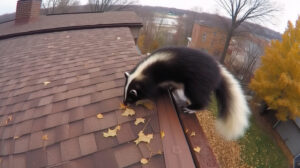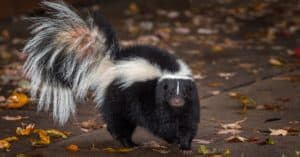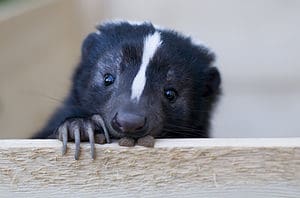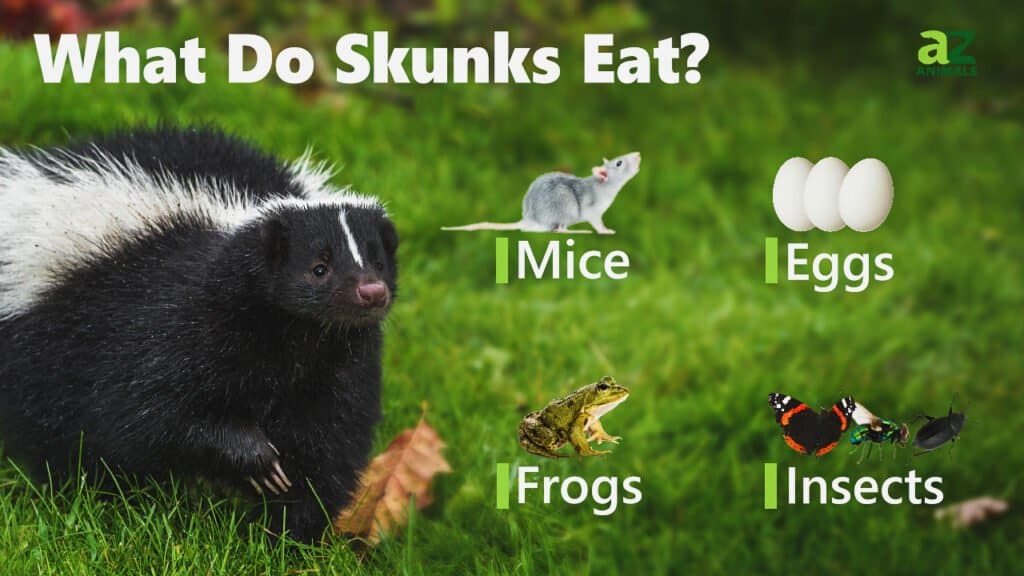
Have you ever smelled the spray of a skunk? If you have, it’s a memory that you likely won’t soon forget. Due to the overpowering stench produced by their anal glands, skunks often get a bad rap. When many people – and predators – see a skunk, their first instinct is to run in the other direction. That said, most skunks generally act quite easygoing and don’t bother people. Prior to the 20th century, skunks were sometimes kept as pets, and some states still allow the practice. Known for their sensitivity and intelligence, skunks easily imprint upon people and possess a playful nature. However, wild skunks occasionally carry rabies, and pet skunks may bite if surprised or threatened. Still, every year, people find young wild skunks or trap skunks with the intent of turning them into pets. This begs the question, “What do skunks eat?”
In this article, we’ll explore what do skunks eat?, along with the ways they locate and hunt for food. We’ll also explore how their diet changes in the winter and summer. Finally, we’ll discuss what pet skunks eat and the specialized diet of baby skunks. Plug your noses, because things might get a little smelly, as we explore what skunks eat.
What Do Skunks Eat?
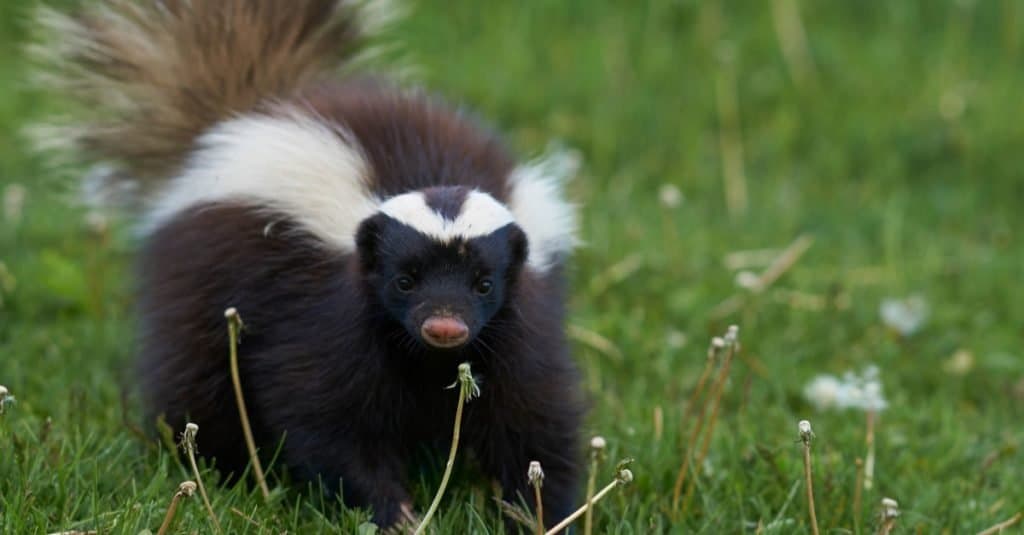
Skunks are omnivores and will eat just about anything they can find.
©Jeremy Richards/Shutterstock.com
Skunks are omnivores and eat a wide variety of plants and animals. They possess a voracious appetite and will eat just about anything edible they can find. This includes things like garbage and trash, especially if they live in close contact with humans. Over the course of the year, a skunk’s diet will change with the seasons. When possible, skunks will prioritize eating high-fat, calorie-rich foods. They will also continue to eat even if full, which can cause obesity and health problems in captive skunks. That said, you can boil down a skunk’s diet to 15 common foods.
Popular foods that skunks like to eat include:
- Small mammals (mice, rats, ground squirrels, and chipmunks)
- Fish
- Small birds
- Eggs
- Small amphibians (frogs and salamanders)
- Reptiles (small snakes and lizards)
- Garbage/trash
- Insects
- Honey
- Nuts
- Seeds
- Vegetables
- Fruit
- Worms
- Carrion
Skunks will also eat left-out pet food and will eat grasses, leaves, or fungi if no other foods are available.
How Do Skunks Forage and Hunt For Food?
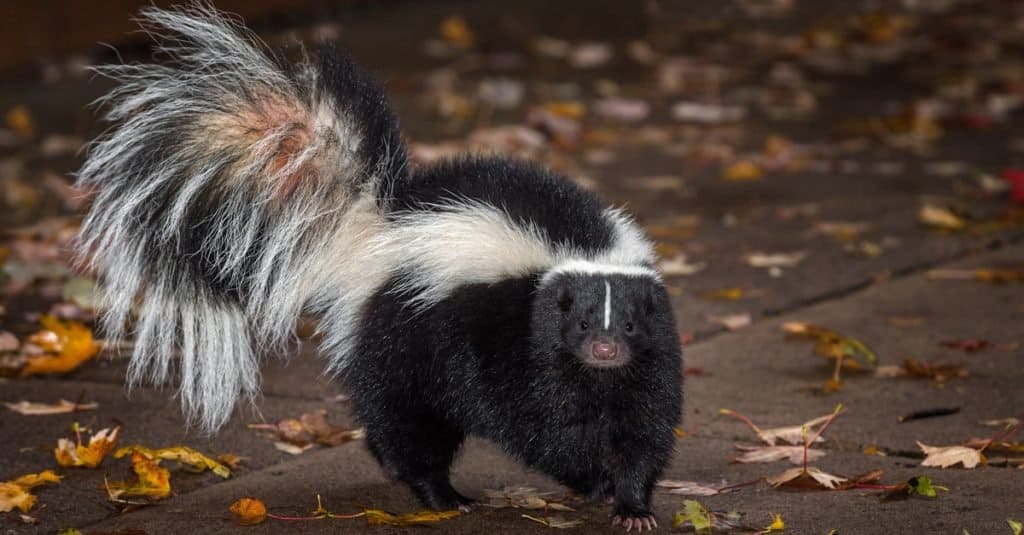
Skunks hunt using their keen sense of smell and hearing.
©Geoffrey Kuchera/Shutterstock.com
As nocturnal animals, they hunt and forage at night, when most other animals lay asleep. Skunks primarily hunt using their keen sense of smell and hearing. Due to their poor eyesight, skunks rarely rely on their eyes to forage and hunt for food. Because of their limited vision, they typically only react to movement or changes in lighting. They use their keen noses to track down smelly foods, such as ripe fruit, honey, carrion, garbage, or small prey. In addition, they use their hearing to detect small prey in their nests. Skunks possess powerful forearms and claws that they use to dig for insects and burrowing mammals. At top speed, skunks can run 10 miles per hour, although they rarely use their speed to catch prey. Instead, skunks rely more on catching their prey unawares, typically when it is nesting in its burrow.
What Do Skunks Eat in Summer?
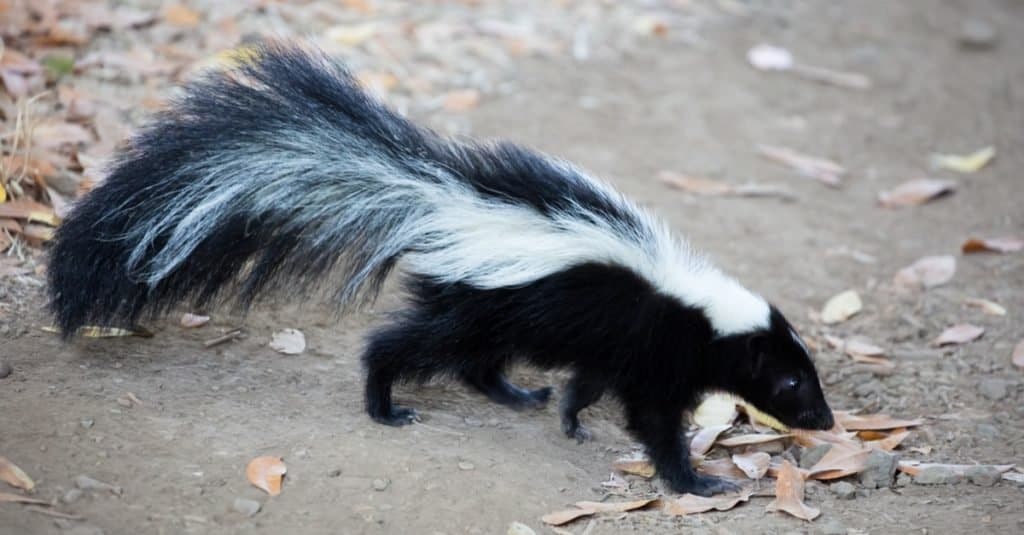
In summer, skunks prioritize eating high-fat, calorie-rich foods.
©yhelfman/Shutterstock.com
In summer, skunks try to put on as much fat as possible in anticipation of the leaner winter months. To accomplish this task, skunks will seek out the most calorie-rich and fatty foods possible. Their favorite foods in summer include fatty fish and small mammals like rats, moles, mice, chipmunks, and ground squirrels. They will also target small birds and their eggs, as well as tiny lizards, salamanders, frogs, and snakes. Insects also make up a large part of their diet in summer, particularly larvae, worms, grubs, and beetles. Skunks love honeybees and will attack a honeybee hive with relish. Their thick fur protects them from stings, and they will eat both adult bees, larvae, and honeycomb. They also frequently dig up and devour hornet and wasp nests, again targeting both the adults and larvae. Outside of these protein sources, skunks will also eat fruits, leaves, grasses, nuts, and seeds.
What Do Skunks Eat in Winter?
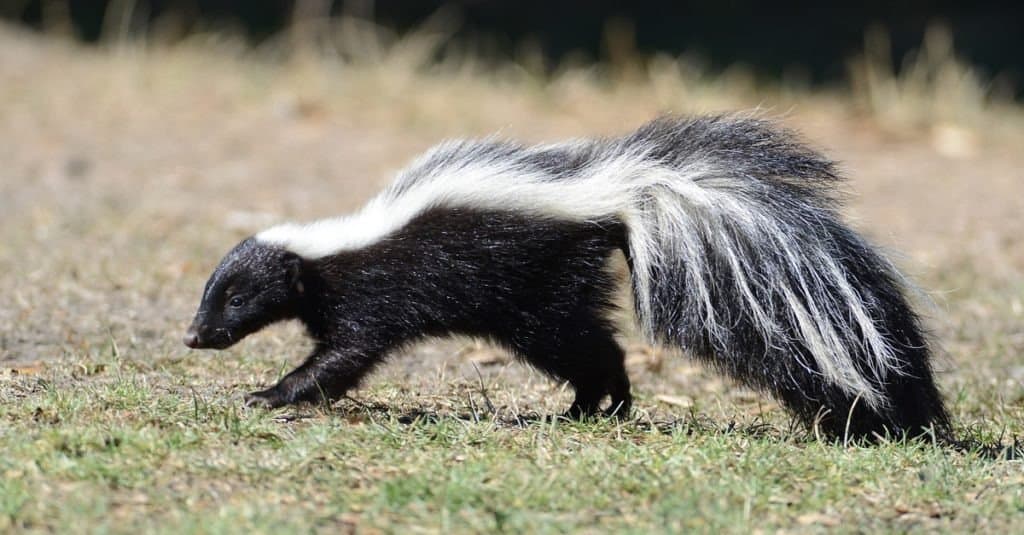
In winter, skunks mostly eat fruits, seeds, nuts, and vegetables.
©Matt Knoth/Shutterstock.com
During winter, skunks enter a torpor similar to hibernation. However, they don’t fully hibernate and will wake up to move around or leave their den to forage at night. As previously mentioned, skunks will eat almost anything that they can find. In winter, fewer foods are available, and so their tastes expand. Skunks living in close proximity to humans may eat larger amounts of trash or garbage. If they can find meat, they will hunt for small nesting animals like mice, chipmunks, or moles. That said, vegetables, nuts, seeds, and fruits constitute the majority of their diet during winter. In winter, skunks will eat fruits like chokeberry, elderberry, mountain ash, wild grape, and cranberry. Nuts and seeds include walnuts, pecans, and hickory nuts, as well as sunflower seeds or even birdseed. They will also feast on carrion if they can find any near their den.
What Do Pet Skunks Eat?
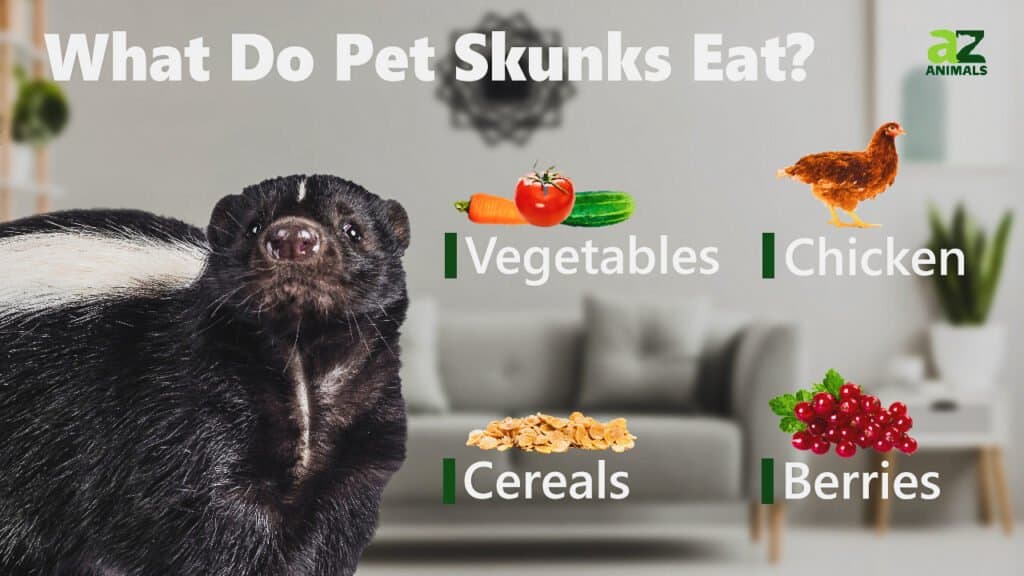
In the wild, skunks will eat pretty much anything they can find. These instincts don’t go away once they become domesticated. On the contrary, your pet skunk will most likely eat anything you put in front of it. Some skunks even develop a taste for garbage, which just goes to show that skunks hardly count as picky eaters. That said, you shouldn’t just go around feeding your skunk hamburgers and potato chips. Skunks enjoy high-calorie foods because they evolved a biological need to store fat so they can survive through the winter. Like humans, skunks can easily grow obese if fed an improper diet, which can lead to long-term health problems.
Generally speaking, skunks function well on a diet of lean meats, vegetables, fruits, and complex carbohydrates like grains. You can serve vegetables, meats, and fruits cooked or raw, but make sure to cook all grains before serving them to your skunk. For meats, stick to lean proteins like chicken or fish. As for grains, prioritize cooked oats, cereals, potatoes, sweet potatoes, or rice. When choosing fruit, choose mostly low-sugar options like berries and melons. However, high-sugar fruits like bananas, apples, or pears won’t hurt if given in small amounts. Finally, leafy greens should make up a large portion of your skunk’s vegetable intake (just skip the lettuce). In addition, you can also include corn, carrots, peas, squash, and other root vegetables, excluding asparagus.
Skunks do not do well on a diet of processed foods. Although they will eat whatever you put in front of them, you should avoid feeding your skunk table scraps and foods full of additives and preservatives. Some foods to avoid feeding your skunk include:
- Asparagus (known to cause seizures)
- Garlic
- Onions
- Chocolate
- Candy
- Processed meats
- Canned cat food
- Fatty, fried foods
- Lettuce
What Do Baby Skunks Eat?
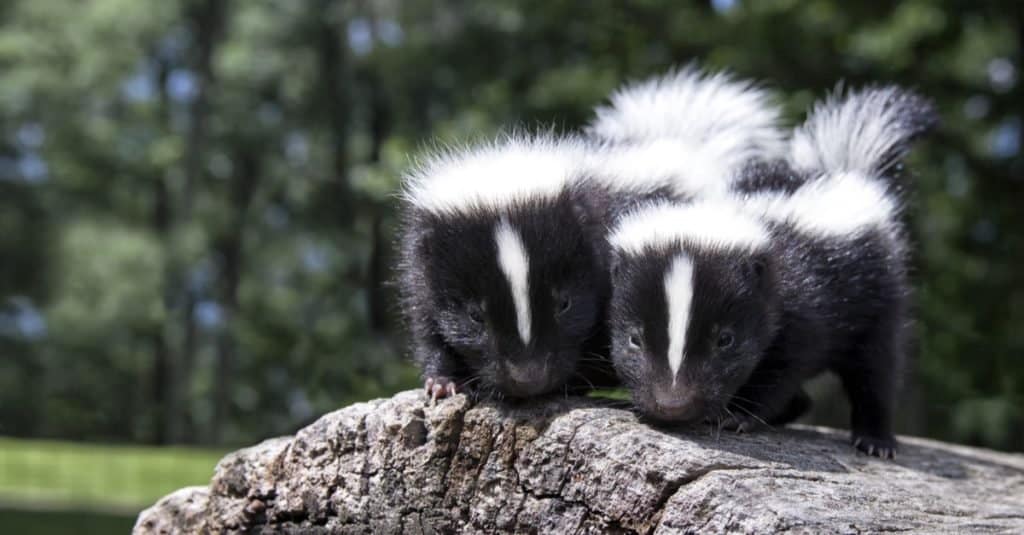
Baby skunks live off their mother’s milk until they reach around 6 weeks old and start to eat other foods. By 2 months, they’ll wean off milk and eat almost exclusively foraged and hunted foods.
©critterbiz/Shutterstock.com
Most female skunks give birth during the late spring or early summer, typically between April and June. Pregnant skunks will find a den without a male and gestate their young for 60 to 75 days. At birth, baby skunks, or kits, cannot see and measure only around 4 inches long. During the first 6 weeks of their lives, baby skunks must rely entirely on their mother for nutrition. After six weeks, they will leave the den, and completely wean off milk after 2 months. In the wild, infant skunks will eat a variety of foods and whatever they can catch. Common forage foods include fruits, vegetables, nuts, seeds, leaves, and grains. They will also hunt for eggs and small mammals like mice, rats, ground squirrels, rabbits, snakes, and chipmunks. In addition, they’ll eat numerous insects and bugs such as worms, snails, slugs, spiders, and grubs.
If you find a baby skunk in the wild, always check to make sure if the mother is nearby. In the event the mother does not appear, call your local wildlife rescue before attempting to care for a baby skunk. Baby skunks require a specialized diet, and will not tolerate eating the same food as a baby dog or cat. In fact, processed pet foods can pose choking hazards, and give baby skunks digestive issues, diarrhea, and other problems. Prior to 6 weeks of age, captive baby skunks should only eat formulae such as KMR liquid or esbilac. Around 6 weeks of age, you can start to introduce small amounts of the same foods that adult skunks eat. You can start by incorporating a limited amount of cooked cereals in their formulae. From there, you can serve small amounts of veggies, fruits, and meats cut into tiny pieces.
Summary of 15 Foods That Skunks Eat
| Foods Skunks Eat | |
|---|---|
| 1 | Small mammals (mice, rats, ground squirrels, and chipmunks) |
| 2 | Fish |
| 3 | Small Birds |
| 4 | Eggs |
| 5 | Small amphibians (frogs and salamanders) |
| 6 | Reptiles (small snakes and lizards) |
| 7 | Garbage/trash |
| 8 | Insects |
| 9 | Honey |
| 10 | Nuts |
| 11 | Seeds |
| 12 | Vegetables |
| 13 | Fruit |
| 14 | Worms |
| 15 | Carrion |
What Are Skunks Afraid of?
Skunks are opportunistic feeders and will often visit areas in search of food. If you are trying to keep a skunk out of your garden or off your property, there are a few things you can do to prevent this adorable, but unwanted visitor. There are certain scents that skunks are not fond of and should keep them at bay. Ammonia, citrus fruits (like lemons and oranges), capsaicin, and vinegar are just a few scents that may prevent them from wandering too close. Follow these steps for a skunk-free yard:
- Ammonia – soak cotton balls or rags with this liquid and place them around your yard. If you have children, they should be kept away from the areas. Replace as needed.
- Citrus – lemon and orange peels produce an acid that is unpleasant to a skunk. You can either scatter peels throughout your area or even plant citrus trees if you’re in the proper hardiness zone.
- Capsaicin – skunks have an incredibly strong sense of smell and this harsh scent, found in chili peppers, will irritate their nasal cavities.
- Vinegar – the strong scent of vinegar, particularly white vinegar, will irritate a skunk’s nasal cavities. Household vinegar works great but a more concentrated version will work best.
The photo featured at the top of this post is © Geoffrey Kuchera/Shutterstock.com
Thank you for reading! Have some feedback for us? Contact the AZ Animals editorial team.



